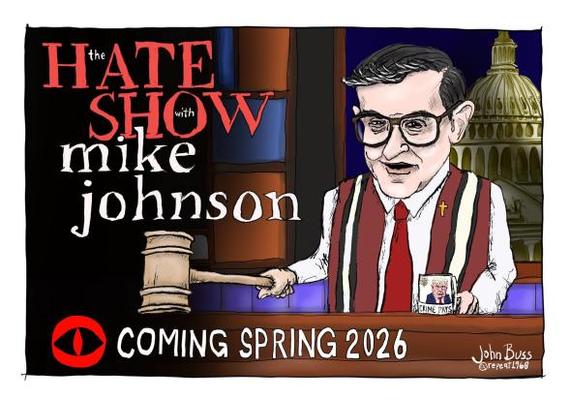Mostly Monday Reads: Free Press vs. a Thin-skinned Putin Wannabe
“Out with the old, a new franchise is born on State Controlled Media, redefining late-night television. Mass for shut-ins step aside.” John Buss, @repeat1968
Good Day, Sky Dancers!
Banana Republics look out! We’re on the road to attaining your status. Yam Tits has had it with all programming that doesn’t reflect his false narratives. There’s also that fake image he tries to project and sell. He’s after all forms of information providers, and just to prove he’s yanking a few chains, I’ve had a difficult time finding critiques in the usual places. So here are three unusual sources for my top reads today.
First up is the CBC. The Canadian Broadcasting Corporation is the Canadian Public broadcaster. It’s still in business. I grabbed this headline from its Entertainment division. John’s cartoon over there really hits the nail on the head today. FARTUS really doesn’t like the truth. “Trump vs. TV: A play-by-play of a wild week taking on the U.S. president’s naysayers. Mocking leaders isn’t new, but critics say political satire is now in the crosshairs.”
First he came for late-night TV, then a daytime talk show and a crude cartoon.
U.S. President Donald Trump and his administration are fighting battles on all fronts when it comes to mockery and criticism of the 47th commander-in-chief.
As speculation swirls that CBS might have turfed The Late Show with Stephen Colbert because of his recent criticism of parent company Paramount Global agreeing to a $16-million US settlement with the president over a 60 Minutes interview, the White House has also come out swinging this week against the animated series South Park and ABC’s The View.
South Park‘s 27th season premiere episode, which aired on Wednesday, lampooned the president and the CBS-Colbert drama and depicted a naked Trump climbing into bed with Satan. That same day, a co-host of The View accused Trump of being “jealous” of former president Barack Obama’s looks and marriage.
Even though he’s known for mocking a range of people he doesn’t like, Trump’s image, persona and brand are what made him a household name, and he doesn’t take it well when he senses attacks on any of them.
While he would largely take out his anger in a Twitter tirade during his first administration (what X was known as back then), there are concerns that Trump is using his power in his second term to influence corporate decision-making and settle grievances — especially when it comes to the news and entertainment industry.
But freedom of expression groups say the political satire and parody that are now under fire are art forms that are not only constitutionally protected but vital to public discourse.
“We have mocked presidents and leaders in this country since before this was a country,” Will Creeley, legal director of the Philadelphia-based advocacy group Foundation for Individual Rights and Expression (FIRE), told CBC News.
“If you can’t make fun of who’s running the country, then the First Amendment doesn’t mean a damn thing.”
So, I suppose using CBC for a source doesn’t surprise you. I probably will surprise you with this one. It’s from The Hill, which isn’t surprising, but the source of the story will be. “Fox News reporter: Trump FCC targeting ‘The View’ could impact network someday.” The way things are going, some day is not that far away. Dominick Mastrangelo has the headline.
Fox News reporter Alicia Acuna warned over the weekend that President Trump’s criticism of networks and shows such as ABC and “The View” could eventually hit conservative media outlets under a Democratic presidential administration.
“As much as it would be nice to think about, like, ‘Oh, “The View’s” gonna go away. Whew, that sounds nice,’ we also have to consider this isn’t the only administration that’s going to be there forever,” Acuna said during an appearance on “The Big Weekend Show”.
“A tool that can be used by this administration can very well be used by the next. And if they were able to do away with ‘The View,’ they could very well — the next administration that comes in that doesn’t like Fox could do the same.”
The reporter’s comments were first highlighted by Mediaite.
Trump has repeatedly ridiculed ABC News over its coverage of his administration and threatened to use the power of his Federal Communications Commission (FCC) to scrutinize the network’s broadcast license.
FCC Chair Brendan Carr, during a recent interview on Fox, suggested “The View,” the network’s table talk news and debate program, could face “consequences” over panelists’ criticisms of Trump.
The Mediate article is worth reading.”Fox News Correspondent Warns Colleagues Not to Celebrate Trump’s FCC for Targeting The View: Next Administration ‘Could Do the Same’ to Fox.” This story comes from the desk of Joe DePaolo. You will notice that there is no shortage of political cartoonists weighing in on the topic. We are all South Park now.
A Fox News correspondent delivered a warning to colleagues celebrating President Donald Trump’s FCC for targeting The View: What goes around could well come around.
During a panel discussion Saturday night on The Big Weekend Show, Fox News senior correspondent Alicia Acuna cautioned her colleagues to be careful what they wish for when it comes to the fate of the ABC daytime talk show — which FCC chairman Brendan Carr recently said could face “consequences” following Joy Behar’s recent criticism of the president.
“As much as it would be nice to think about, like, ‘Oh, The View’s gonna go away. Whew, that sounds nice!’ We also have to consider this isn’t the only administration that’s going to be there forever,” Acuna said. “A tool that can be used by this administration can very well be used by the next. And if they were able to do away with The View they could very well — the next administration that comes in that doesn’t like Fox — could do the same.”
Fox News host Guy Benson concurred.
“I think that is a wise warning,” Benson said.
Carr — in a Thursday interview on Fox’s America’s Newsroom with anchor Bill Hemmer — said The View could have “issues.”
“Is The View now in the crosshairs of this administration?” Hemmer asked Carr.
“Look, it’s entirely possible that there’s issues over there,” Carr said. “I mean, again, stepping back, this broader dynamic, once President Trump has exposed these media gatekeepers and smashed this facade, there’s a lot of consequences. I think the consequences of that aren’t quite finished. And look, The View‘s got a lot challenges there. It wasn’t that long ago, I think, one episode, one show alone, they had to stop, interrupt the show, and read four separate legal notices to try to avoid legal liability. So I’m not surprised to hear people saying that their ratings are struggling.”
Now for my third source, Inside Radio. “Former FCC Chairs Warn of Troubling Shifts in Media Oversight, DEI Policy.”
Former Federal Communications Commission members are sounding the alarm — the nation’s media watchdog is being weaponized, its independence eroded, and decades-old norms tossed aside. At the Multicultural Media, Telecom and Internet Council’s annual Former FCC Chairs’ Symposium on Friday, they said the stakes for media — and democracy — have rarely been higher.
During a wide-ranging discussion in Washington, media policy took center stage early in the conversation. Former FCC Chair Mignon Clyburn issued a blunt assessment. “The Trump FCC 2.0 has abandoned its traditional role, and it has been unprecedented over, you know, when you look out over the 90-year history,” she said.
The former Chair under President Obama added that the Commission is now stepping into areas historically beyond its scope. “Traditionally, the FCC focused on communications-specific concerns, not general corporate employment practices. That’s the shift that we’re talking about here, and that is what I find problematic,” Clyburn said.
The panel then turned to a longstanding pillar of broadcast regulation — the public interest standard — and whether it still has a place in today’s competitive media environment.
Reed Hundt, who chaired the FCC during the Clinton administration, pointed out the inherent vagueness of the concept.
“The problem with the public interest standard is that you don’t know what it is when you see it, and you can’t define it,” Hundt said. “Every time the FCC has tried to write it down, the appellate court has thrown out their effort.” He suggested the Commission should consider eliminating the standard entirely. “It shouldn’t be a weapon that anybody can use. It should be a guideline for the industry that can be followed. But it isn’t,” Hundt said.
Clyburn reinforced the point by contrasting the Commission’s historical focus with its recent approach. “Traditionally, the FCC focused on communications-specific concerns, not general corporate employment practices,” she said. That is reference to the Trump administration’s push to get broadcasters and other industries regulated by the FCC to abandon diversity, equity, and inclusion efforts.
It’s really a difficult period of American History if the rabbit hole I have to go down into is the country’s ongoing loss of First Amendment Rights. But killing a free press is the first strategy of a nascent dictator-wannabe. Give an old professor a break as she heads straight to the academic studies. IMS keeps track of Journalism around the world. I was particularly drawn to this piece. “How autocrats use the media to keep control. A trend of democratic backsliding throughout 2020 escalated in an extreme way in 2021. From Myanmar to Belarus, powerholders have unravelled years of human rights achievements with dramatic arrests of journalists, destroyed infrastructure and regime changes – and people’s access to information and their right to freedom of expression have been among the casualties.” I picked this one because it was written prior to the Trump Regime, but it looks like the MAGA playbook straight out of Project 2025. The word “Lawfare” has entered the American lexicon.
“Lawfare” uses laws and legislation to limit the press, whether that means bureaucratic licencing requirements for journalists and media houses or using defamation laws to intimidate critical voices. Defamation laws have manifested as anti-blasphemy laws in Pakistan; national security laws in Hong Kong; and through “fake news” laws with broad phrasing such as those that gained steam under the pretext of Covid-19 safety but have been used to control populations.
Even Nobel laureate Maria Ressa has been the target of multiple cyber libel charges, in addition to the harassment and threats incited towards her. The charges against her under these laws were also used as a threat to prevent her from traveling to Oslo to receive her Nobel peace prize before the courts eventually relented. Similarly, an increasing number of strategic lawsuits against public participation – known as SLAPPS – have been used by powerful figures around the world to intimidate critics who may not be able to withstand the financial or psychological toll of court cases.
Mass communication relies on complex networks: from the initial report until the audience receives the final story, access to information requires different physical and digital infrastructures.
It comes as no surprise, then, that autocrats would seek to control infrastructure as a way of repressing freedom of expression. It is easy to point to the extreme, physical destruction of infrastructure, such as the Israeli airstrikes hitting multiple Palestinian media houses – including IMS partner Filastinyat – or in 2022 the Russian bombing of the Kyiv TV Tower. But control of infrastructure is often more insidious.
There is a power play between governments and tech companies over who owns and controls our means of communication – and who has access to people’s data. It is not uncommon for telecoms companies to be owned by oligarchs who are friendly towards a regime. Even in cases such as the Norwegian mobile network Telenor, which left Myanmar rather than cooperating with the military, the infrastructure was sold to a company that was willing to cooperate with the military.
Big Tech allows much to happen on its watch. While social media platforms have been used to spark revolution, they have also been sources of hate speech and disinformation, leading to polarisation and violence. A lack of knowledge of the local contexts in which they operate allows mis- and disinformation to spread from government and unofficial sources. Without consistent policies on what they are willing to tolerate, Big Tech seems most motivated by protecting profits, leaving countries with oppressive governments only once they are forced to and not because of ethical considerations for populations.
Autocrats have a variety of tools at their disposal to supress and intimidate critical voices. The above four steps create fear or lead journalists to lose or leave their jobs, or – in extreme cases – costs journalists’ lives.
Subsequently, defending press freedom and freedom of expression cannot be managed by fighting on only one front. This has always been clear, and strongly underlined by events in 2021 (and the beginning of 2022). Interventions must come from legislative angles and from lobbying international tech companies that profit while looking away from undemocratic policies. And the international community needs to hold their focus on the struggles of journalists and populations under autocracies, not just when dramatic events grab the headlines, but in the day-to-day battle for people’s rights.
Trump’s dalliance with suing The Wall Street Journal is also back in the headlines. This is from CNBC’s Dan Mangan: “Trump seeks quick deposition of Rupert Murdoch in Jeffrey Epstein letter defamation case.” And of course, there is some dank shit in the brief from Trump’s team. This description really got me laughing.
“Trump’s lawyers cite Murdoch’s advanced age to submit to questioning under oath earlier than would be normal, suggesting that Murdoch will either be too ill or dead to testify at trial.”
I mean, was that really necessary?
Lawyers for President Donald Trump asked a judge on Monday to order Rupert Murdoch to sit for a deposition within 15 days for Trump’s $10 billion lawsuit accusing the media mogul of defaming him in a Wall Street Journal article about a “bawdy” birthday letter to sex offender Jeffrey Epstein.
Trump’s lawyers cited Murdoch’s advanced age to submit to questioning under oath as a chief argument in their motion to compel him to testify earlier than would be normal in such a lawsuit, suggesting that Murdoch will either be too ill or dead to testify by the time the case goes to trial.
“Murdoch is 94 years old, has suffered from multiple health issues throughout his life, is believed to have suffered recent significant health scares, and is presumed to live in New York, New York,” Trump’s lawyers said in their legal filing in Miami federal court.
“Taken together, these factors weigh heavily in determining that Murdoch would be unavailable for in-person testimony at trial,” the lawyers wrote.
The attorneys also cited the fact that there is, as yet, no order scheduling the exchange of evidence and testimony in the case.
You’ll notice how this got a lot of ‘play’ in Scotland and the UK. This article appeared in The Guardian, and the film was all over Social Media. “Rough deal: Social media roasts Trump’s golf game after clip appears to show alleged cheating in Scotland. Trump has long been accused of cheating at golf and mixing politics and business on the course.” Josh Marcus has the story about the ball that went into the roughest of the rough only to be replaced on the green by his caddie.
Social media users pounced on a clip that appears to show Donald Trump cheating on the golf course during his ongoing trip to Scotland, the latest in a long line of accusations that the president cheats on the fairway.
In the video circulated by liberal commentators, a caddy appears to walk ahead of the golf-loving president in his golf cart and drop a ball behind him as the president approaches.
“Trump working hard to bring down grocery prices,” the caption says, making a satirical reference to the president’s campaign promises to tackle inflation and costs.
“For the morons that think Trump doesn’t cheat at golf and wins all those club championships fair and square….watch his caddie here,” another account wrote.
The phrase “commander in cheat” was soon trending on the social media site.
“The video of Trump’s caddy doing an Oddjob Slazenger drop isn’t a big deal; cheating at golf isn’t nearly the worst thing about Trump,” wrote The Atlantic’s Tom Nichols. “But watching the cult of personality try to explain it away is really some creepy North Korean level stuff.”
The Independent has requested comment from the White House.
The president has faced a long list of accusations that he doesn’t play fair from figures ranging from actor Samuel Jackson to LPGA player Suzann Pettersen.
Trump’s alleged cheating, which has always denied, is even the subject of a book: Rick Reilly’s Commander in Cheat.
“At Winged Foot, where Trump is a member, the caddies got so used to seeing him kick his ball back onto the fairway they came up with a nickname for him: Pele,” Reilly writes in the book.
The enticing Nichols quote can be found on X. Just letting you know, since I’m not going there or linking to it. If this little romp across the pond was supposed to highlight the strength of Orange Caligula, it failed. Although it was funny watching all the EU leaders head to Scotland to try to get TACO to just freaking make a decision on the tariffs. If he’s interested in bringing down inflation, tariffs would still not be in the headlines. Yammering about lower interest rates to the Fed Chair wouldn’t be in that policy either. He needs to find the closest community college to take Economics 101 and 102. He absolutely knows nothing about anything economics-related.
If this is really the best he can do to get the public attention off the Murdoch scandals, he’s surely failing. The Rapist-in-chief is now clearly in the box with Epstein’s enabler and partner in sexual assault and battery of children. This is from AXIOS. “Ghislaine Maxwell files Supreme Court brief appealing Epstein conviction.” There are at least two guys sitting on that court who have assaulted women. What does that say about justice and our country?
Ghislaine Maxwell pressed ahead with an appeal to the Supreme Court on Monday, seeking to overturn her conviction on the grounds that she was unlawfully prosecuted for sex trafficking minors with Jeffrey Epstein.
Why it matters: The filing by Maxwell, who was sentenced to 20 years in federal prison in 2022, comes just three days after she met with a top Justice Department official tapped to re-examine the Epstein case.
- The Trump administration has faced weeks of bipartisan backlash after reneging on promises to release all files related to the now-deceased sex trafficker.
- MAGA activists have suggested that Maxwell, a British former socialite, could be the key to exposing new information about the alleged elite pedophile ring at the heart of Epstein conspiracy theories.
Zoom in: Maxwell’s appeal revolves around a highly controversial 2007 plea agreement Epstein negotiated with the U.S. Attorney’s Office in the Southern District of Florida.
- “The United States,” the plea agreement stated, “agrees that it will not institute any criminal charges against any potential co-conspirators of Epstein, including but not limited to” four other suspects.
- Maxwell was not listed as one of those suspects — but her lawyers argue she didn’t need to be.
Between the lines: Maxwell’s attorneys, the husband-wife team of Mona and David Oscar Markus contends that a plain reading of the deal protects unnamed co-conspirators as well, since it explicitly says it’s “not limited to” those listed.
- Markus also argues that language in the deal — promising immunity from “the United States” — means Maxwell couldn’t be prosecuted for Epstein-related crimes anywhere in the country.
- “The government’s argument, across the board, is essentially an appeal to what it wishes the agreement had said, rather than what it actually says,” Mona Markus wrote in the petition.
The other side: The Justice Department says former U.S. Attorney Alex Acosta, who negotiated the deal, didn’t have authority to bind other federal districts — including the Southern District of New York, where Maxwell was ultimately tried and convicted.
The intrigue: Federal appeals courts have split over the key question of whether a plea deal struck by one U.S. Attorney’s Office applies to the entire Justice Department.
- The Justice Department acknowledged that divide in its own brief, but has urged the Supreme Court to reject Maxwell’s appeal.
- “The government was not even aware of [Maxwell’s] role in Epstein’s scheme at that time,” DOJ argued, calling her “at most, an incidental third-party beneficiary of the agreement.”
Welcome to another Monday in Trumplandia.
What’s on your Reading, Blogging, and Action list today?
#BrettCavanuagjSexualBattery #CommanderInCheat #ConservativeRepublicanSexualBatteryAndChildRape #DemocraticDecline #GhislaineMaxwell #GolfCheaterInChief #Lawfare #Trump #TrumpAndTheFirstAmendment #TrumpAttacksOnMedia #TrumpHebephile #UncleClarenceThomas #YamTits




